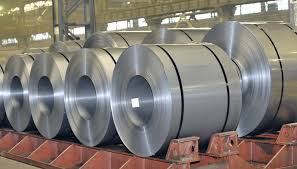
Money Update- "What about those tariffs" Where is the market headed? April 15, 2018

Are YOU ready for earnings seasons? Well GET ready!
Money Matter fans and readers,
Some markets eh? Well with all the fuss running about from Washington, China, Korea and who knows where else, I am not concerned for now at least as far as the market goes and our portfolios. As indicated in previous shows and articles lately, a correction of a technical nature was needed and long overdue. We sold no positions for the reason of fear. Only reallocated to other areas if I thought prudent. We also added some positions in areas I think are attractive. As also noted recently, the earnings season started on Friday and I mentioned some big banks were up first and they had set the bar high so I was cautious on friday's start and how the earning season would begin but then also mentioned I thought good things were in store. Friday indeed was mixed from the banks right on cue and now its on to the bulk of earning reports and I am of the opinion it should be a great next couple of weeks bar any political upheavals (but we all know those can happen!)
So let us see if I am right and watch markets rally with good earnings. My opinion only of course as always! Now read on about the tariffs and my take on them and also about my favorite: Dividend Paying Stocks and Funds,
"Watching the markets so you dont have to"
Marc
-----------------------------------------------------

The media has been rife with news about the Trump steel tariffs and the opinions run the gamut from full support to outright stern objection. The argument is not so much about whether our steel industries need protection as whole as an argument could be and has been made that China, the target of the tariffs, has been playing unfairly in the arena of free trade. Although most of the media coverage has centered around the specifics of the industry in question, the microscope of analysis should be explaining and detailing how tariffs are thought to work and whether tariffs in general are a useful and efficient remedy to such maladies. Simply put, this particular tariff is an additional tax placed on Chinese steel. Therefore the price of domestic steel would not be reduced.
The obvious reasoning is that by making an import more expensive though tariffs and thereby making American steel more attractive by comparison, our domestic steel industry would benefit.
The first question I would ask is wouldn't a tax credit offered to our steel companies serve the same purpose?
Think of it this way:by installing tariffs on imported steel, the price of domestic steel would not drop in nominal terms. The cost savings to the industries that use steel therefore would not be reduced. These steel consuming industries such as the auto and packaging companies to name a few would see no savings.
Meanwhile the tariff money goes into the coffers of those that initiated the tax, and that means into government coffers.
I have always made the argument that if the governing authorities want to help the bulk of the economy, meaning the consumer, a tax credit would serve the same purpose by giving our industries the needed break in question.
The difference is by allowing domestic steel companies to take a tax credit, they could offer their steel at lower prices to those consuming it. That in turn would mean lower steel prices to those that make the end products which is all the stuff you and I buy that use steel. This would result in a general price reduction in all products that use steel and its related products and that in turn would mean more money in the pockets of American consumers to spend on other items in the economy.
Conversely, when a tariff is used, there is no price reduction in the end product which means the consumer saves nothing. The money which is the tariff tax goes into government coffers and that should be the end of the story but it’s not. It is generally believed the import tariffs actually cause price increases in whatever end product is in question so you get a double whammy and not in your favor dear reader.
One could argue the government would use those additional monies to spend on whatever it spends its money on, but since the consumer is the driving force of all economies, putting that money into the hands of the everyday Joe would not only help a struggling constituency which is all of us, but get into the economy that much quicker.
It’s believed by some, this analyst included, that money in the hands of consumers is more wisely spent with less waste than putting that money into an already bloated bureaucracy known as Uncle Sam.
In each specific case a tariff is implemented, the subsequently higher priced import does make the domestic product more attractive by comparison, but besides stuffing government coffers, the consumer would see no benefit from reduced prices. In fact the consumer would likely see higher prices. Compare this to a tax credit which would have a similar effect on domestic steel demand yet have the additional benefit of lowering prices to the consumer.
That the powers at be wish to help domestic producers and assist in what arguably could be unfair practices is the obvious reasoning. That the money goes into the hands of Washington instead of into the American consumer is the larger issue and something few people are even discussing.
------------------------------------------------------------------------------------------------------------

Grab your part of the distributions~
What is a dividend?
Dividends are payments by companies to people who own their stock. When we think of a bank savings account we think of the interest they might pay us. With stocks, there can be different types of payments and dividends are one kind of payment. Think of it like a thank you note for buying a company’s stock. Some stocks and funds pay dividends and some do not.
Let’s say you buy a stock of Jack’s Warehouse (fictional). The stock is a dividend paying stock. Let’s also say you buy a share of Jill Muffin Company (fictional) and Jill’s doesn’t pay a dividend.
Jacks stock says it will pay a dollar a share annually, paying 25 cents on a certain day every three months. Over the course of a year, that amounts to a buck. Note I didn’t say a percentage but an actual dollar amount and in this case a buck.
For sake of example, say you bought both Jill’s stock and Jacks stock at 10 bucks on January first and at the end of the year both stocks are at 11 bucks. Each had the same increase in price, one dollar from ten to eleven. Both stocks made 10% for you. Jacks stock however also paid you a dividend of a dollar. Nice.
Keeping mind dividends are listed in dollar amounts and not percentages, if you buy a stock for ten bucks and get a dollar dividend you made 10 % on the dividend. However if the stock drops in price such as in a market crash, and the company keeps the dividend, the next buyer, since he buys the stock at a lower price, say 8 bucks, he still gets a dollar a share in dividends so he makes more percentage wise and in that particular case comes out to 12.5 %. One reason why if you buy dividend stocks you might make the argument you like market crashes because your yield percentage wise is greater.
Can a dividend be cut, eliminated or even increased? Absolutely. Dividends are not guaranteed. But keep this in mind. Usually company CEOS, VPS’s and board members get stock as part of their compensation. So they benefit from the dividends as well. The more shares they hold the more they make as well. The dirty little secret however is dividends can be taxed at lower rates then salaries. Single taxpayers can now make $50,600 (in 2018) and still qualify for the zero-percent tax on dividends and capital gains. Joint filers and surviving spouses can make $101,200, and head of household filers can make $75,700.
When you compare that to personal income statistics in the U.S., you’ll see that about 70% of taxpayers in the U.S. can qualify for the zero rate on dividends and capital gains!
Even if you make too much money to qualify for the 0% tax rate on dividends and capital gains, you can still qualify for a special low 15% rate.
So do you think company execs want to cut or eliminate your dividend when they get them too and might pay less tax than their salaries?
All in all if you like the possibility of income or just growing your nest egg, and you consider some stocks pay dividends and some don’t, which would you rather own?
For more information feel free to contact me below.
Dividends are not guaranteed and can be decreased, increased or eliminated at any time. Dividends do not guarantee against losses. Dividends may be taxable in certain types of accounts and stocks which pay dividends does not mean losses, either partial or total are not possible. Please review the prospectus of any company you are considering and consult with your investment professional before making any investment decisions. Investing involves risk. You can lose money. This article expresses the opinions of Marc Cuniberti and are opinions only and should not be construed or acted upon as individual investment advice. Mr. Cuniberti is an Investment Advisor Representative through Cambridge Investment Research Advisors, Inc., a Registered Investment Advisor. Marc can be contacted at SMC Wealth Management, 164 Maple St #1, Auburn, CA 95603 (530) 559-1214. SMC and Cambridge are not affiliated. His website is www.moneymanagementradio.com. California Insurance License # OL34249







